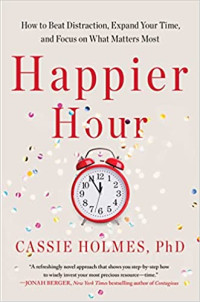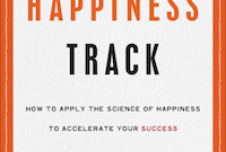Like many people I know, I often feel like there aren’t enough hours in the day. Working, daily meal prep, household repairs, and seemingly endless appointments occupy large chunks of my days, leaving little time for the things that matter most to me—like hiking in nature, creative projects, and hanging out with the people I love.

How can I change this pattern? That’s the topic of Cassie Holmes’s new book, Happier Hour. Holmes, a researcher and professor at UCLA’s Anderson School of Management, provides a treasure trove of ideas on how to reassess the way we spend our time and prioritize the things that make for a happier, more meaningful life.
One could argue that this topic has been mined before, but Holmes comes at it a little differently than most. For one thing, she doesn’t assume the only way to feel less busy is to give up bunches of activities—or to cut back or retire from work. In fact, as Holmes points out, being not busy enough can have similar effects on our well-being as being too busy, because it can make us feel idle or without purpose.
Instead, she and fellow researchers have studied how happiness is linked to discretionary time—when we aren’t doing what we have to do, but what we want to do. It turns out that there are better and worse ways to use discretionary time if happiness is our goal. Following the guidance and exercises contained within the book can help you figure out which activities to forgo and which to prioritize to create a more fulfilling life for yourself.
How we spend our time now
To start, Holmes recommends doing a detailed accounting of how we actually spend our time, so that we know where we’re currently using up discretionary time and can make better choices. Most of us have a vague sense that we’re wasting time watching TV, scrolling through social media, or gaming, but do we realize how much or how little enjoyment or sense of meaning we derive from these activities? Only if we analyze our days can we figure out what makes us happiest and when we’re just mindlessly filling our time, she argues.
For most people, doing an exercise like this makes them realize that the biggest source of happiness and meaning in life is their relationships. But many of us give these short shrift—or aren’t fully present even when we’re with the people who matter most. If we’re leaving on our cell phones while socializing with friends or thinking about work while walking a child to school, we are missing out on the moments when we could be fully engaged with the people we love and build the deep social connections that make life worthwhile.
“Simply close out of that social media app you’re in and dial up a friend to actually talk. Or when you go into the office, initiate a genuine conversation with a colleague about what’s going on in your lives,” writes Holmes. “Having strong relationships and feeling a sense of belonging is critical.”
Holmes understands that we can’t always be doing the things we love. Most of us have to work, do housework, or commute—often our least favorite activities. But, she says, we can enjoy even these things more than we do by “bundling” less pleasant activities with pleasanter ones. For example, if you have a long commute to work, you can listen to an audiobook on the way; or, while folding the laundry, you can talk to a friend on speakerphone. Bundling this way can make the time pass more quickly and make life happier.
“Don’t spend the hours of your workweek waiting for them to pass. This is the time of your life, and you can’t let it go to waste,” writes Holmes. “With a tiny bit of intention, you can turn this time from seeming worthy of the trash bin into a treat.”
When it comes to your job, you probably can’t bundle those same activities into your workday. But you can still increase your happiness at work by infusing it with a sense of purpose (the reason why you do this work), creating moments of flow (deep, undisturbed engagement with your work, where you lose track of time), or building stronger connections with colleagues. Each of these things make work more enjoyable—and may make you more productive, too.
No one has more than 24 hours in a day, of course. But there are a few more activities Holmes suggests that can actually make us feel as if we have more time, and that can make us less stressed out. For example, using our time to perform small acts of kindness or to get a dose of awe has been found to make us feel more time-rich than time-poor. Holmes recommends adding these practices—as well as regular exercise—to our everyday lives as a way to boost our mood and help us feel less rushed. Of course, that means making time for them—even when we think we’re busy.
How to savor the good times
For the things we already enjoy doing, Holmes suggests ways to get more out of them, too. But first you need to understand the concept of hedonic adaptation, where even things that make you super happy can lose their appeal with time. Whether it’s listening to a favorite song, eating at your favorite restaurant, or date night with your romantic partner, happy experiences can get old if you do them repetitively without breaks or variation. It’s best to space these experiences out or infuse something novel into them lest they get stale, says Holmes.
 Happier Hour: How to Beat Distraction, Expand Your Time, and Focus on What Matters Most (Gallery Books, 2022, 320 pages).
Happier Hour: How to Beat Distraction, Expand Your Time, and Focus on What Matters Most (Gallery Books, 2022, 320 pages).
“Hedonic adaptation occurs because we stop noticing when the same good thing happens again and again. Change, however, makes us pause and pay attention,” says Holmes.
One of Holmes’ favorite ways to increase happiness, she writes, is to treat the weekend like a vacation—meaning, don’t fill it with chores or other “must do” activities. By making weekends a special, rejuvenating time, you can find more happiness and feel more refreshed when you return to the weekdays.
She also recommends some tried-and-true well-being practices, like keeping a gratitude journal or writing gratitude letters. Though not a meditator herself—“I am too fidgety and impatient, and I find sitting still to meditate extremely difficult”—she does recognize the benefits of being mindful and recommends alternative practices for staying present. And, as she found when helping students analyze their days for their happiest moments, it’s always good to find time in nature.
“It turns out that simply stepping outdoors to an open sky overhead is a shared source of well-being,” she writes.
Putting it all together near the end of the book, Holmes makes the case for crafting our days like an artist might. She recommends writing out a weekly schedule of what you need to do, then blocking out times to do what fills your life with meaning and makes you happiest—time with friends, activities that fulfill your purpose, time for reflection, time in nature, or time to do nothing but daydream. She also suggests that, while you spend this time, make it a “no phone zone” so that you aren’t distracted and can get more out of it. And, if there are things you hate to do but have to do, bundle them with something you enjoy.
For me, this was wise advice that I have taken to heart. Though I’d long ago recognized hiking in nature as my happy place, I’ve also decided to take longer breaks from my cell phone, make regular dates with some of my closest friends, and put on music when I cook dinner (for me, not a favorite activity—but I love rock and roll!). Maybe reading this book will encourage you to make your own days happier, too. After all, as author Annie Dillard wisely wrote, “How we spend our days is, of course, how we spend our lives.”








Comments